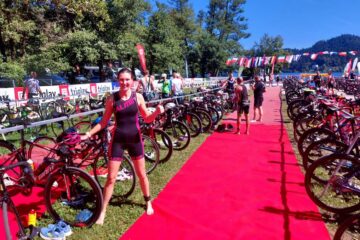As you dive into the world of swim, bike, and run, you may find comfort in knowing that running is your strong suit. But don’t let that lull you into a false sense of security. In this blog post we’ll explore the importance of training for running, even if it’s your strongest discipline, and share some tips to survive the run leg of your triathlon race. Let’s lace up our shoes and dive right in!
The Final Push: Understanding the Importance of Run Training
Running, the last leg of a triathlon, can make or break your overall performance. Many people make the error of going ‘all out’ in the bike session to find that at the end they have no more energy left to complete the run leg. So, even if you’re a natural runner, the exhaustion from the preceding swim and bike segments can take a toll on your legs for us all. So even though you might want to concentrate on the bike and swim training more than the run, it’s still super important to fit in these sessions during the week, and here’s why:
1. Muscle Adaptation
While you may have strong running skills, your body needs to adapt to the specific demands of the triathlon run. Incorporating running into your training regimen helps build endurance and teaches your muscles to perform under fatigue.
2. Mental Endurance is just as important!
The transition from biking to running is not just a physical challenge; it’s also a mental one. Training for running when your legs are tired helps you develop mental resilience, enabling you to push through the discomfort and maintain focus during the final leg.
Practice Makes Perfect: Tips to Survive the Run Leg
Now that we’ve covered the significance of training for the run leg, let’s explore some practical strategies to help you overcome tired legs and finish strong:
1. Brick Training:
Incorporate brick workouts into your training routine. These sessions involve combining two disciplines back-to-back, such as a bike ride followed immediately by a run. Yes, it’s not fun the first few times you do it, as you’re legs will feel like they are jelly or not even part of your body. They don’t listen to your mind saying “run”. But don’t worry, it’s completely normal.
By doing this and making simulations of the transitions on a regular basis as the race draws near, your body will become accustomed to the unique feeling of these transitions and particularly running on fatigued legs.
2. Progressive Runs:
Gradually increase your running pace during training runs. This technique not only improves your overall speed but also trains your body to adapt to running when your tired. So, start with an easy pace and gradually increase your speed throughout the run. Your body will get better and quicker at adapting to the increased tempo.
3. Cross-Training:
Of course in triathlon you are already doing great cross-training with swimming training and cycling. If you have even just 10 mins, try to build overall strength and improve your muscular endurance through strength training, or yoga, or pilates. This approach ensures that all your muscles are well-rounded and can handle the demands of the run leg 🙂
4. Mental Preparation:
Mental execution also plays a huge part in making it to that finish line. Personally, I struggle to keep focused when racing the run section during a race because I am exhuased. What’s recommended, and what we try to do in the run-up to the race is to rehearse the run leg during training. What does this mean exactly?
Well there are two points to this:
1. You should try to visualize yourself transitioning smoothly from the bike and conquering the run. Here you can visualize exactly what you need to do when you enter into the transition so when it comes to the race day, it feels much more natural and less ‘thinking’ effort is required.
2. You’ll go through up’s and down’s during the race and particularly during the run. When you’re feeling like it’s just time to give up, this is the moment to focus on positive self-talk and remind yourself that you can do it. Just remember all your previous accomplishments which you never thought possible.
These two different mental preparations help us a LOT when we find ourselves in a state of ‘tiredness’ during the final km of the race. It helps us maintain a strong mindset during the triathlon and we hope it will be a useful trick for you to implement too!
5. Recovery and Rest:
Of course, it’s important to give your body ample time to recover. Rest and proper nutrition are vital for optimal performance. Prioritize sleep, eat nutritious meals, and incorporate active recovery strategies such as foam rolling and stretching into your routine.
So, we’re super excited to have ‘runners’ deciding to try triathlon for a new challenge, it’s fantastic and really can help strengthen your body all round (rather that focusing on the muscles specific used for running)! However, although you may be coming from a ‘running’ background as a beginner triathlete, training for the run leg is still essential, even if it’s your strong point.
Of course it’s important to train and feel confident swimming and cycling, but remember that the final leg of the race can be challenging, especially when your legs feel tired after having already swam and run.
By incorporating specific training techniques, mental preparation, and giving your body the rest it needs, you can conquer the run leg and cross that finish line with a smile on your face. Embrace the journey, enjoy the process, and remember, you’re capable of achieving remarkable things. Good luck in your triathlon endeavors!



0 Comments